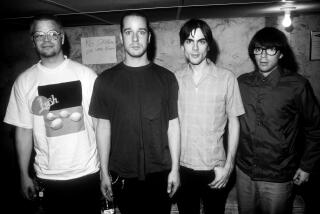Mazzy Star co-founder David Roback, leader of L.A.âs âPaisley Underground,â dies at 61
The reclusive musician David Roback, whose haunting guitar tones as founder of Los Angeles bands including Mazzy Star, Opal and the Rain Parade helped define the sound of the cityâs 1980s and â90s rock underground, died Monday at age 61. Along with Mazzy Star singer Hope Sandoval, Roback earned international attention for hits including âFade Into You,â âBlue Flowerâ and âInto Dust.â
Robackâs death was confirmed by his publicist. No cause of death was given.
Were it up to him, Roback likely would have preferred this obituary ended there. Stubbornly press-shy, he was philosophically opposed to pop musicâs cult of personality, and didnât care to reveal much about himself at all.
âSo much about music is overdetermined by television and what people write and say about it,â Roback told The Times in 1993, just as Mazzy Starâs breakthrough album âSo Tonight That I Might Seeâ was coming out.
âYou have to leave something to peopleâs imagination, so they feel they can participate. Music is music. We donât want to be part of that over-determination. We feel you should be able to shut your eyes and listen to it.â

The millions of listeners who took heed were mesmerized. Recorded as if in an abandoned cathedral, Robackâs production on Mazzy Star songs tapped influences including the more meditative side of the Doors, the twelve-string jangle of the Byrds and the âRubber Soulâ-era Beatles. But dreamier, as if Robackâs cathedral were draped in lace. One reviewer in The Times described their music as âvelvet blues.â
Like many guitarists coming up in the late 1970s and early â80s, Roback found inspiration in the L.A. post-punk scene, to a degree. âI felt like a punk,â he told The Times in 1990, âbut when I picked up the guitar and started playing it, the music didnât come out sounding punk. It was something else.â
Roback manifested that âsomething elseâ in 1983 as a member, with brother Steven, guitarist-vocalist Matt Piucci and others, of the Rain Parade. Armed with Rickenbacker guitars, the band had no time for punkâs hard and fast rules. Songs from its debut album werenât urgent cries but slow-moving psychedelic mantras.
Along with bands including the Bangles, the Dream Syndicate and the Three OâClock, the Rain Parade were often mentioned as part of the scene that became known as the Paisley Underground. But by then Roback had left the band, moved to Berkeley and devoted himself to composition.
Despite his desire to let his music define him, the period that followed shaped Roback to the public as some sort of musical mystic. Teaming up with former Dream Syndicate bassist Kendra Smith and drummer Keith Mitchell under the moniker Clay Allison, Roback released a four-song EP called âFell From the Sun.â The symbol on the recordâs cover, a mysterious circular design with menacing barbed spokes, hinted that the music within might be ritualistic. The songs within were heavy but slow, like T. Rex on Xanax.
Roback also produced and curated the 1984 communal album âRainy Day,â which featured members of the Rain Parade, the Bangles, the Dream Syndicate and the Three OâClock performing covers of songs by the Velvet Underground, Jimi Hendrix, Neil Young, Big Star, the Beach Boys and others.

Roback formed Opal with Smith and Mitchell in the mid-1980s and issued its only album, âHappy Nightmare Baby,â in 1987. Released on the then-high-flying indie label SST, the album earned praise, but was a stark contrast with more aggressive label mates Sonic Youth, Dinosaur Jr. and the Meat Puppets.
Smith left Opal during its first national tour. Her replacement was Sandoval, and she proved the perfect muse for Robackâs productions. Renaming themselves Mazzy Star, they released their debut album, âShe Hangs Brightly,â in 1990. Recorded for respected British indie Rough Trade, it was warmly received â The Timesâ Robert Hilburn called it âa blend of urban anxiety and country-accented canyon innocenceâ â and earned Roback and Sandoval a label deal with Capitol Records.
Two years in the making, âSo Tonight That I Might Seeâ was released in 1993. With the rest of the rock world consumed with Nirvana, Pearl Jam and Green Day, the album was hardly a safe bet. Instead of grunge rage, Mazzy Star was offering graceful, melancholy songs of love and loss. But it found an audience among gothic romancers who enjoyed a touch of darkness with their beauty. The albumâs hit, âFade Into You,â earned the band its biggest hit, peaking at No. 44 on the Billboard Hot 100.

After releasing âAmong My Swanâ in 1997, Mazzy Star went on hiatus. Roback moved to Norway, appearing on records only occasionally. He played on British folk singer Beth Ortonâs album âCentral Reservationâ and guitarist Bert Janschâs âThe Black Swan.â
In 2012, Roback and Sandoval reconvened at the Coachella Valley Music and Arts Festival, where they performed their reserved ballads to a rapt crowd. The band released its final album, âSeasons in Your Day,â the following year. Though it hardly drew the attention or acclaim equal to âFade Into You,â Roback never focused on the applause.
âI didnât feel the acceptance or the attention was important to me,â he told The Times in 1990. âI wanted to make music that I felt and if people liked it, fine, otherwise the music would be enough reward.â
More to Read
The biggest entertainment stories
Get our big stories about Hollywood, film, television, music, arts, culture and more right in your inbox as soon as they publish.
You may occasionally receive promotional content from the Los Angeles Times.










